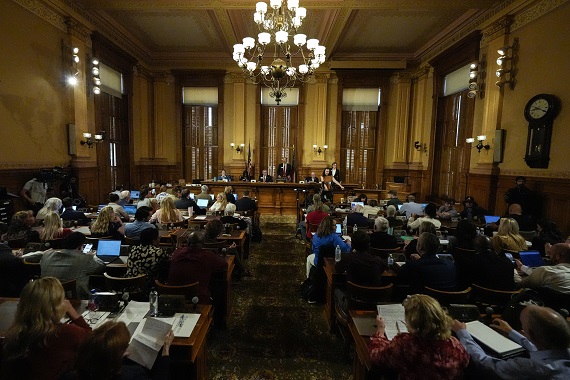By Kate Brumback Associated Press
Atlanta (AP) — Georgia’s State Election Board on Friday voted to approve a new rule that requires poll workers to count the number of paper ballots by hand after voting is completed.
The board approved the rule, going against the advice of the state attorney general’s office, the secretary of state’s office and an association of county election officials. Three board members who were praised by former President Donald Trump during a rally last month in Atlanta voted to approve the measure, while the lone Democrat on the board and the nonpartisan chair voted to reject it.
In a memo sent to election board members Thursday, the office of state Attorney General Chris Carr said no provision in state law allows counting the number of ballots by hand at the precinct level before the ballots are brought to county election superintendent for vote tallying. As a result, the memo says, the rule is “not tethered to any statute” and is “likely the precise kind of impermissible legislation that agencies cannot do.”
Secretary of State Brad Raffensperger last month called the hand counting rule “misguided,” saying it would delay the reporting of election results and introduce risks to chain of custody procedures.
The new rule requires that the number of paper ballots — not the number of votes — be counted at each polling place by three separate poll workers until all three counts are the same. If a scanner has more than 750 ballots inside at the end of voting, the poll manager can decide to begin the count the following day.
(Please click onto the image of the cat to hear Classical Music)

Voters in Georgia make their selections on a touchscreen voting machine that then prints out a paper ballot that includes a human-readable list of the voter’s choices as well as a QR code that is read by a scanner to tally the votes.
The proponents of the new rule said it is needed to make sure that the number of ballots in the scanners at the end of the day matches the number of voters recorded by check-in computers and the number of ballots recorded by the voting machines and the scanners. Memory cards that record the votes at the polling places are what is used to tally votes on election night.
Several county election officials who spoke out against the rule during a public comment period preceding the vote warned that having to count the ballots by hand at polling places could delay the reporting of election night results. They also worried about putting an additional burden on poll workers who have already worked a long day.
Leaders of the Georgia Association of Voter Registration and Election Officials raised concerns similar to Raffensperger’s in a letter to the State Election Board last month, warning the rule would ultimately undermine confidence in the process. The nonprofit association’s members include over 500 election officials and workers statewide, according to the organization.
Janelle King, a board member who worked with the author of the rule on the wording, said she wasn’t concerned if election night reporting is slowed a bit in favor of making sure that the number of ballots is accurate.
“What I don’t want to do is set a precedent that we’re OK with speed over accuracy,” she said as the board was discussing the rule proposal. “I can guarantee you, as a voter, I would rather wait another hour to ensure that the count is accurate than to get a count given within that hour and then to find out at the close of an election after certification has already taken place that we have people suing because the count is not accurate.”
The new rule will now be filed with the secretary of state and will take effect 20 days later.
The board also tabled until 2025 a proposal for a similar count at early in-person voting locations.
The election officials association urged the State Election Board in a letter Tuesday not to consider any new rules when Election Day is less than 50 days away, ballots are already going out and poll worker training is well underway.
“We do not oppose rules because we are lazy or because a political operative or organization wants us to,” the letter says. “We oppose rules because they are poorly written, inefficient, would not accomplish their stated goals, or go directly against state law.”


